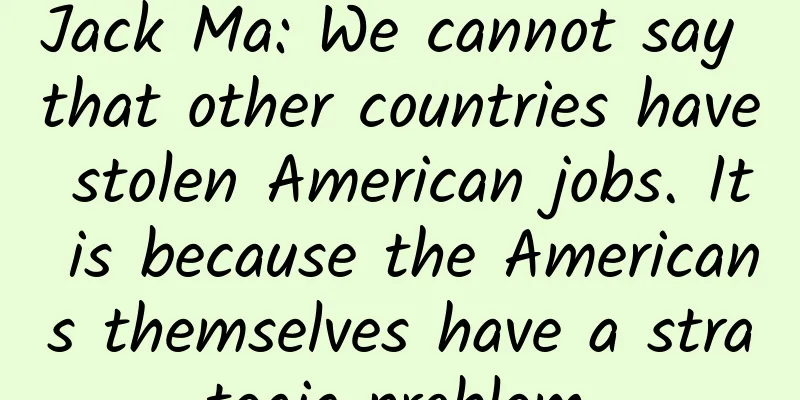Jack Ma: We cannot say that other countries have stolen American jobs. It is because the Americans themselves have a strategic problem.

|
In the early morning of January 19th, Beijing time, Jack Ma was interviewed by New York Times columnist Andrew Ross Sorkin in a special dialogue session at the Davos Forum. It is said that this was the most popular dialogue at the Davos Forum. It may be because Jack Ma has too many symbols: he just met with Trump, the Internet economy, Sino-US relations... Sorkin started by asking about the content of the meeting between Jack Ma and Trump, and the discussion extended to the prospects for globalization amid the rise of trade protectionism. It was Trump who approached Jack Ma and asked if they could have a talk. Sorkin: We will have a Q&A session and talk about topics such as Alibaba, China, Trump and the United States, globalization and trade. Welcome again, Mr. Jack Ma! You just visited Trump Tower and met with President-elect Donald Trump. Can you tell us about that meeting? Jack Ma: The meeting was productive and much better than I expected. Solkin: What are your expectations? Jack Ma: Like everyone else, I have heard and read a lot about him. After I went in, I felt that he was open-minded and willing to listen to my views. I was very happy with the results of the conversation. He offered to take me downstairs, and I think he must be very happy with the results of this meeting. Solkin: Did you call him or did he call you? How did this meeting come about? Jack Ma: This is also a question I asked myself. One day, someone asked me if you want to meet with the president-elect. I said, really, I am not ready yet, I don’t know what to talk about. A few days later, I received a few more emails from a friend asking the same thing. I thought maybe I should go and talk, at least Trump might be happy with what I said, so I went. We discussed small and medium-sized enterprises, agricultural products, and Sino-US trade, especially focusing on enabling American companies to sell to Asia through our network, which will create a lot of jobs for them. Solkin: You promised to create 1 million jobs in the United States in the next five years. Are they not directly employed by Alibaba? Jack Ma: We don’t hire. Alibaba has 45,000 employees. We can’t hire 1 million people. I can’t imagine that we can manage 1 million people. It's not other countries that stole American jobs, it's the United States that made a strategic mistake Solkin: Could you please tell us how you view the China-U.S. relationship and what do you think of Trump's previous remarks about China manipulating its currency? Did you discuss this during the meeting? Jack Ma: First of all, there is freedom of speech in the United States. He can say whatever he wants. I respect and understand. But I also have my own views. We will not debate Sino-US trade and manipulation, but we have reached some consensus: small and medium-sized enterprises, developing the Midwest, helping local farmers and small and medium-sized enterprises export to China. We will not talk about the loss of American jobs to Mexico, China, etc. Can I share my views? First, 30 years ago when I just graduated from college, we heard about the wonderful strategy of the United States, outsourcing manufacturing jobs to Mexico and China, and outsourcing services to India. There is a book called "The World Is Flat" written by Thomas Friedman. I think this is a perfect strategy. The United States said that it only wants to control intellectual property, technology, and brands, and leave lower-level jobs to other parts of the world. This is a great strategy. Second, American international companies have made millions of dollars through globalization. The top 100 American companies are amazing. When I just graduated from college, I wanted to buy a Motorola BB machine, which cost $250. My salary was only $10 a month, and the cost of making a BB machine was only $8. In the past 30 years, companies such as Microsoft, Cisco, and IBM have made tens of millions of dollars, more than the four major banks in China combined, more than China Mobile, China Unicom, etc. combined, and their market value has increased by more than 100% in the past 30 years. So where did the money go? As a businessman, I am very concerned about the balance sheet, where the money comes from and where it goes. Over the past 30 years, the United States has spent $14.2 trillion on 13 wars. What if some of this money was used to invest in infrastructure and help white-collar and blue-collar workers? No matter how good your strategy is, you should invest in people. Not everyone has the opportunity to go to Harvard, like me, we should invest in those who can't afford to go to school. Another thing that I am curious about is that when I was young, I heard about Ford, Boeing and other large manufacturing companies in the United States, but in the past 20 years, I have heard about Silicon Valley and Wall Street, and the money flowed to Wall Street. Then, the 2008 financial crisis happened, and $19.2 trillion was lost. This is a huge amount of money, which robbed white-collar workers and destroyed 34 million jobs worldwide. If this money did not flow to Wall Street, but was invested in the Midwest and developed industries there, it would bring a big change. It is not that other countries stole your jobs, but your strategy, and you did not think and allocate funds properly. This is my opinion. Globalization requires optimization Solkin: Now we see a strong resistance to the reshaping of globalization. In fact, most of the discussions in Davos revolved around this topic. The resistance happened in the United States, but President Xi Jinping came to Davos yesterday, and you were one of his companions. What do you think of his speech? Jack Ma: Globalization is a good thing. The United States is a developed country that taught us how to globalize. I remember when we joined the WTO around 2001, we were all very worried - what if international brands and products came to China and destroyed our industries and made us lose our jobs? You convinced us at the time, but 20 years later you said it was a terrible thing. I think globalization is good, but globalization needs to be optimized. This is the problem that President-elect Trump hopes to solve. I think globalization should be inclusive globalization. In the past 30 years, globalization was controlled by 60,000 large companies; 100 years ago, it was controlled by a few kings. What if we can support 6 million companies to operate across borders in the next 30 years? What if we can support 20 million small and medium-sized enterprises to operate across borders in the next 30 years? We believe that globalization should be inclusive. Solkin: Do you think that what President Xi mentioned will happen? China has represented the East for many years, and now the United States will continue to act on behalf of everyone? Jack Ma: President Xi mentioned yesterday that this is the best of times, but also the worst of times. The world needs new leaders, but new leaders mean working together, that's my understanding. The new leader doesn't need to be a specific one to teach everyone what to do and what not to do, but the world needs to unite. As a Chinese businessman, I like and am proud of what President Xi mentioned yesterday - as a businessman, I hope that the world can shoulder the responsibility and work together; as a Chinese, I am also happy with his commitment, that China, as the world's second largest economy, should shoulder the responsibility. This is the first time I have heard a Chinese leader make a quantitative commitment, he said that our imports will reach 8 trillion US dollars in the next five years, which makes me excited because China is transforming from export to import, if a specific data target can be achieved, it will be a huge change for China and the world. Solkin: Today China is relatively more interested in globalization because the benefits it brings will continue to support China's growth towards a "developed country". What do you think about this? Jack Ma: First of all, the WTO rules were not made by China, nor were they made for China. What I want to change is that the WTO was designed for big companies in the past, and only big companies could participate. China has also benefited a lot from opening up, and I think China should learn one thing - China was able to grow in the past because we were open to the world. If we can continue to open up... (but not completely open, for example, if American companies want to enter China, they need to cooperate with local companies?) This is why I say that China also has its problems, the world has problems, and China certainly has many of its own problems. China should be open and confident, etc. President Xi's words yesterday gave me confidence that he is ready to open China further to the world. This is my suggestion, we should solve the problem through business groups and through negotiations. China has been in the WTO for more than ten years, and I think whether it is as a company, as a country, or as the world as a whole, we need to re-examine it. It's not just because of unbalanced things - we can call a halt. Sorkin: You proposed the eWTP. What is it specifically? Jack Ma: The WTO is great, but it is mainly designed for developed countries and their companies. There is no opportunity for small and medium-sized enterprises. We hope to establish eWTP, Electronic World Trade Platform, to support young people and small and medium-sized enterprises, so that they can trade cross-border online through mobile phones and the Internet. In addition, the WTO is also a very interesting organization. It can bring 20 governments together and reach a consensus on one thing. This is simply impossible. I can't imagine that all parties can reach a consensus. Business should be decided by businessmen. I think eWTP should be a thing that business people sit down to discuss, negotiate, reach a consensus, and then get government support. Differences from Amazon Sorkin: I think most Westerners may not understand Alibaba and your business model. Can I try to compare you with Amazon? You may think it is unfair. But what I find interesting is that Amazon is pursuing a business model that is more like a heavy asset business model. They buy airplanes and want to own the entire supply chain. Alibaba, on the other hand, does not want to operate its own warehouses or logistics companies. What do you think about this? Is Jeffrey Bezos (Amazon founder and CEO) right, or are you right, or will you meet in the middle? Jack Ma: I hope both sides are right, because the world does not have only one business model. If the world has only one "correct" business model, the world will be very boring. We need a variety of models. People who work for a certain model must believe in this model. I believe in what I do. As for the difference with Amazon, Amazon is more like an empire that controls all links, from buying to selling; our philosophy is to build an ecosystem. Our philosophy is to empower others, assist them in sales and services, and ensure that they can be more powerful than us, and ensure that our partners, 100,000 brands and SMEs can compete with Microsoft and IBM because of our technology and innovation. We believe that through Internet technology, we can make every company an Amazon. Last year, our GMV (gross merchandise volume) exceeded US$550 billion. If we want to hire employees to deliver these goods, we need 5 million people. We can't hire 5 million people to deliver the goods sold on our platform. The only way we can do is to empower service companies and logistics companies to ensure that they can operate efficiently, make profits, and hire more people. Solkin: If you don't own the supply chain, can you guarantee efficiency? Amazon can now deliver goods to your home within a few hours. Jack Ma: Last year, we achieved same-day delivery in 125 cities in China. Ten years ago, it took eight days to mail from Beijing to Hangzhou. Now it takes 12 hours to deliver from Beijing to cities in Inner Mongolia. Logistics efficiency has improved. You can't expect to achieve such progress in one day. We have enough patience. On Double 11 in 2016, we sold $17 billion worth of goods on our platform. We delivered a total of 600 million packages in three days. This is what is happening and what we are proud of. It's not how much money we make, but how much power we have. We can make technology more inclusive and every small business can use it. This is my dream. I founded my first company in China in 1992, a small company. In order to borrow $5,000 from the bank, I spent three months applying and still failed. It's really difficult to run a small business. Today, with the development of technology, we can empower people. This is what I want to do. On "fakes" and entering Hollywood Solkin: One criticism that continues to be leveled at Alibaba is copyright infringement. Intellectual property is a big issue in China, but Alibaba is a big target of criticism. What progress do you think Alibaba has made, and how do you view regulators in other countries, including the United States, who are still questioning Alibaba? Jack Ma: First, when you have such a large business scale, you must learn to accept criticism. You must listen and then judge what is right and what is wrong. Second, as an e-commerce platform that empowers 10 million small businesses, we will not be like Amazon Buy, especially for goods worth $550 billion, you can't check them all, this is a problem with the e-commerce model itself. Third, in the past 17 years, we have been a leader in anti-counterfeiting and intellectual property protection. But we are an Internet company and have no law enforcement power. If we find someone selling counterfeit goods, we can remove him from the platform, but we can't arrest him. Last year, we sent 400 counterfeiters to prison and removed 370 million counterfeit goods from the shelves. We are not only a leader in anti-counterfeiting, we use big data to monitor who is buying, who is manufacturing, who is selling, and where the address is. We are now happy that the world, especially the Chinese government agencies, are aware of this problem. The good thing is that if you ask these "criminal gangs" today, these counterfeiters and sellers of counterfeit goods, they will say that they can go to any platform but now they dare not go to Taobao Tmall because our big data technology can find out who they are and where their addresses are, and submit them to the police to capture them. Solkin: You said something before about the quality of fakes? Jack Ma: What I said about the quality of fakes is not to praise fakes, but to say that after so many years, these brand merchants must be very careful, because the quality of fakes is greatly improving, which is very scary. This is the difference. You find the counterfeiter, someone says it is a fake, you go to a third party to verify whether it is a fake, and sometimes the fake quality is better. Another more scary thing is that a brand says you are selling fakes. We searched for a long time and wanted to find the problem but couldn't find it. Later, we sold a product from the flagship store and sent it for inspection, and they said it was a fake. This is very confusing. Fighting counterfeiting is a fight against human greed. It is not easy at all and it is impossible to end it, but we must continue to fight. We invest 2,000 full-time staff and 1 billion yuan in fighting counterfeiting every year. It is impossible to end the war in two years. If people continue to criticize, it is important that we are happy with the progress. If people praise me and say Jack Ma you are great! I know it is not great. Or Alibaba is great! We are not great, we are just a 17-year-old company. But if they say that you are not doing anything to fight counterfeiting, no, we are doing a lot of things, but you don’t have to argue, you just have to do what you believe in. Solkin: You mentioned the use of big data in fighting counterfeiting. On the other hand, you also use big data in the credit system to enable people who cannot get loans to get loans. Let's talk about Sesame Credit. If there is a trading market where some people may not have a credit record, how do you determine who can get a loan and who should not? Jack Ma: First of all, we had a system that taught computers how to identify fakes and fraud on Alipay. We have been doing this for ten years. Now people call it AI. We are a data company. Eight years ago, we said to ourselves that we cannot be an e-commerce company, but a data company. We have data on consumers, manufacturers, logistics, transactions, etc. But how to use this data to benefit society? Many small businesses in China are very good and have good credit, but there is no credit system suitable for them. How to use our data to build a credit system that everyone can access? This has been very powerful in the past four years. We give everyone who uses our services a credit rating. In the past five years, we have issued 5 million small business commercial loans, even if they only ask for a loan of $5,000. It takes 3 minutes to decide whether to lend and how much money to give, and the money will be credited in 1 second. No one needs to contact them. We call this 310. Sesame Credit can also be used as a capital for dating. The mother-in-law said to the future son-in-law, if you want to date my daughter, show me your Sesame Credit score. If people go to rent a car, they will also be asked to look at their Sesame Credit score. If they don't pay back the money, their credit score will be lowered and they may not be able to rent a house. This is the system we want to build. If you buy and sell counterfeit goods, Sesame Credit will also reflect it. Sorkin: Last question, there has been a lot of speculation about your entry into Hollywood. You and Alibaba's name appeared in several blockbusters at the beginning of the year. What is Alibaba's ambition to enter Hollywood? Jack Ma: Every five years, we review our strategy and look ahead to the next 30 or 10 years. We ask ourselves one question for all strategic issues: Is it solving social problems? We believe that the more social problems we solve, the more successful we will be. The second question is, will this project be successful in ten years? Then we will do it. If it can be successful in one month or one year? Then we don’t have to do it. How can it be successful in one year or one month? Five years ago, we had a big debate about what China needs most in the next 10 or 20 years. The final decision was happiness and health, the double H strategy. Hollywood movies can bring people happiness. Now no one is happy, rich people are not happy, and poor people are not happy. At least watching movies can make people happy, and I think we should cooperate with Hollywood. There are many heroes in China, and Chinese heroes always die, while American heroes will never die. If all heroes die, who would be willing to be a hero? I want my heroes to survive, and we should learn more about this. We have only been doing this for two years, and there are still eight years to go. I want my company to be more than just an e-commerce company, but to give people inspiration. I get a lot of inspiration from movies. My favorite movie is Forrest Gump. Life is hard, and this is what I learned from it, and I got a lot of inspiration. In the past 17 years, people said I was crazy and stupid, you are crazy, do something impossible! You are a fool, how can you do this model, Amazon is this model, eBay is this model, why is Alibaba this model? I said to myself, Forrest Gump said, keep doing it, don't care what others think. Forrest Gump also said, no one can make money, people make money by catching shrimps. So, we serve small businesses. "I don't want to die in an office, I want to die on a sunny beach" Audience: How do you ensure that you won't mess up people's lives? You are the one with the power to make decisions. How do you ensure that you won't control the entire credit system? Jack Ma: First of all, I am not sure. This is an uncertain world. Every day is uncertain. The only thing that is certain is yesterday. I don’t know if I will become a dictator or stupid. That’s why I think I should retire while I am young. I have many things I want to do. I want to do charity, be a teacher, and do environmental protection. The world is so beautiful. Why do I always have to be the CEO of Alibaba Group? I came to this world not to work, but to enjoy my life. I don’t want to die in an office, but on a sunny beach. Audience: Do you think China will enter a trade war? If the Trump administration starts a trade war with China, will Alibaba be affected? Jack Ma: I think China and the United States should not have a trade war. There should never be a trade war. I think we should give the Trump administration some time. He is an open-minded person. He listens to everyone. I think it is very easy to start a war, but it is very difficult, even impossible, to end a war. Look at the Iran war, the Afghanistan war, is it over? No. I believe one thing, when trade stops, the world will be in trouble. Trade allows people to start communicating, and everyone exchanges culture and values. If China and the United States reach an agreement, Alibaba's business model will be destroyed. If this can stop the trade war, I am also happy to destroy Alibaba's business model. How can you imagine that the world's largest economy and the world's second largest economy have a trade war? This will be a disaster for the world. If we can stop the war, we should do anything to stop it. Jack Ma: Can I make a few final remarks? I want to make one last suggestion to everyone here, and all governments need to pay attention - the next 30 years are very important for the world. Each technological revolution takes 50 years, the first 20 years for technology companies to emerge and the next 30 years for technology to be applied. So let's focus on the next 30 years. In the previous 20 years, eBay, Amazon, Facebook, Alibaba, Google... were born... It's great, but the most important thing is to make technology inclusive and change the world. This is the next 30 years. Let's pay attention to those 30-year-olds, because they are the Internet generation, they will change the world and become the builders of the world. Third, let's pay attention to those small businesses that may have less than 30 employees. 30-year-olds and 30-person companies will make the world a better place. Sorkin: Thank you very much, Mr. Jack Ma, thank you! As a winner of Toutiao's Qingyun Plan and Baijiahao's Bai+ Plan, the 2019 Baidu Digital Author of the Year, the Baijiahao's Most Popular Author in the Technology Field, the 2019 Sogou Technology and Culture Author, and the 2021 Baijiahao Quarterly Influential Creator, he has won many awards, including the 2013 Sohu Best Industry Media Person, the 2015 China New Media Entrepreneurship Competition Beijing Third Place, the 2015 Guangmang Experience Award, the 2015 China New Media Entrepreneurship Competition Finals Third Place, and the 2018 Baidu Dynamic Annual Powerful Celebrity. |
>>: Where is the future of car-sharing amid the tide of financing?
Recommend
How powerful is Google's Go program AlphaGo? 30,000 times more powerful than IBM's Deep Blue
The first match between man and machine Go - Goog...
Travels of a Grain of Dust
Author: Cen Keqin, Bao Ying, Zhou Yi, Xi'an M...
Is listening to music to maintain health reliable? Let's take you into the wonderful "music therapy"
Author: Sun Zhenghai Qiqihar Medical College Scho...
China's latest discovery with the Insight Telescope! Wuhan University's Astronomy Department-led team makes new contributions to black hole research!
On September 1, the world's leading academic ...
Huaisha's 40 Lectures on "The Three-Body Problem"
Huaisha's 40-lecture introduction to "Th...
Today, call 81192 again!
"Call 81192 The decks are clear, the airspac...
Why do beverage bottles have five-petal flowers on the bottom?
Review expert: Meng Meng, associate researcher at...
New evidence of extraterrestrial life was discovered on this planet!
A team led by scientists from the Southwest Resea...
Analysis of the Douyin app operation and promotion plan!
Short videos have become the hottest track in rec...
If you don't pick up "trash" in autumn, you've wasted your whole year on earth
In autumn, we see a lot of fallen leaves, fruits,...
Baotou SEO Training: How to quickly improve website inclusion and weight?
How to increase website entry? 1.URL submission T...
What are the functions of the Guangzhou Farmhouse Mini Program? How to develop the Farmhouse Mini Program?
With the continuous improvement of living standar...
Read the full text of The Widowed Sister-in-law novel for free, and read the full text of The Rural Widowed Sister-in-law for free without pop-ups!
Introduction to the novel of the widowed sister-i...
Drinks are also divided into different grades?! As expected, the ones I like to drink are C and D...
Shanghai recently piloted a "Nutritional Cho...
How to advertise on Google? Just 12 steps!
Google Ads is a pay-per-click (PPC) system that a...









